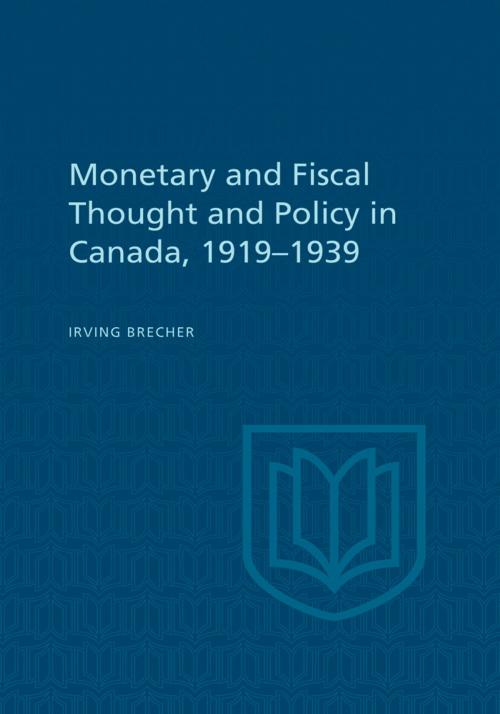Monetary and Fiscal Thought and Policy in Canada, 1919-1939
Business & Finance, Economics, Money & Monetary Policy, Theory of Economics, Nonfiction, Social & Cultural Studies, Political Science, Politics, Economic Policy| Author: | Irving Brecher | ISBN: | 9781442650787 |
| Publisher: | University of Toronto Press, Scholarly Publishing Division | Publication: | December 15, 1957 |
| Imprint: | Language: | English |
| Author: | Irving Brecher |
| ISBN: | 9781442650787 |
| Publisher: | University of Toronto Press, Scholarly Publishing Division |
| Publication: | December 15, 1957 |
| Imprint: | |
| Language: | English |
In this careful and thorough study of a Canadian field which has been relatively untouched in recent years, Dr. Brecher records and comments on the development of monetary and fiscal thinking in Canada in the inter-war period, and its impact on public policy in the federal sphere. Examining Canadian opinion about economic theory during this time, the author draws on four fields of thought: that of government and other public officials; of businessmen, such as bankers, and their views on what should be done about the depression; of the "radical group", such as those prominent in the formation of the CCF and Social Credit parties; and of economists, prominent in the universities.
Dr. Brecher points out in his preface that his inquiry is rooted in the conviction that the problems associated with cyclical fluctuations remain sufficiently complex to make an understanding of the developments of the twenties and thirties an indispensable condition for effective stabilization policy. He finds the twenties distinguished only in the superficial and imperfect diagnosis of and remedial suggestions for unemployment, made chiefly by a relatively small handful of thinkers associated with the Progressive and United Farmers movements, then emerging in the West. It was the thirties which, under the impact of the depression, witnessed the first real stirrings of careful economic analysis in cyclical terms, and of statistical techniques for measuring the value of annual productive activity and income receipts in the Dominion.
The author has attempted to appraise the evolution of the Canadian policy of monetary and fiscal stabilization within the thought environment in which it was conceived and implemented, and on the basis of the standards set by modern income-employment theory.
In this careful and thorough study of a Canadian field which has been relatively untouched in recent years, Dr. Brecher records and comments on the development of monetary and fiscal thinking in Canada in the inter-war period, and its impact on public policy in the federal sphere. Examining Canadian opinion about economic theory during this time, the author draws on four fields of thought: that of government and other public officials; of businessmen, such as bankers, and their views on what should be done about the depression; of the "radical group", such as those prominent in the formation of the CCF and Social Credit parties; and of economists, prominent in the universities.
Dr. Brecher points out in his preface that his inquiry is rooted in the conviction that the problems associated with cyclical fluctuations remain sufficiently complex to make an understanding of the developments of the twenties and thirties an indispensable condition for effective stabilization policy. He finds the twenties distinguished only in the superficial and imperfect diagnosis of and remedial suggestions for unemployment, made chiefly by a relatively small handful of thinkers associated with the Progressive and United Farmers movements, then emerging in the West. It was the thirties which, under the impact of the depression, witnessed the first real stirrings of careful economic analysis in cyclical terms, and of statistical techniques for measuring the value of annual productive activity and income receipts in the Dominion.
The author has attempted to appraise the evolution of the Canadian policy of monetary and fiscal stabilization within the thought environment in which it was conceived and implemented, and on the basis of the standards set by modern income-employment theory.















